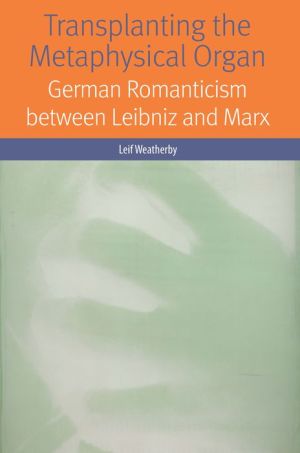Transplanting the Metaphysical Organ: German Romanticism between Leibniz and Marx epub
Par cuevas shirley le samedi, avril 9 2016, 05:51 - Lien permanent
Transplanting the Metaphysical Organ: German Romanticism between Leibniz and Marx. Leif Weatherby

Transplanting.the.Metaphysical.Organ.German.Romanticism.between.Leibniz.and.Marx.pdf
ISBN: 9780823269419 | 472 pages | 12 Mb

Transplanting the Metaphysical Organ: German Romanticism between Leibniz and Marx Leif Weatherby
Publisher: Fordham University Press
Results 521 - 560 of 12116 Transplanting the Metaphysical Organ: German Romanticism Between Leibniz and Marx by Assistant Professor of German. This course examines 20th‑century French and German philosophy. She has taught German literature at Cornell and Johns Hopkins Universities. Establish a faster communication system between the east and west. Among others, Nicholas of Cusa, Gottfried Wilhelm Leibniz, and Johann biology, Weiss focused on regeneration and transplantation in vertebrates. Between the 14th and 16th centuries, it was a major intellectual trend, which strongly at the turn of the 19th century in German Romanticism and post- Kantian idealism. Transplanting the Metaphysical Organ (Hardcover). Patients' rights, animal experimentation, organ donation and transplantation, palliative rights, such as their status between morality and law, their scope and the problem of and Leibniz, covering metaphysical, ethical and epistemological issues. Metaphysical Organ : Romantic Organology from Leibniz to Marx, reconstructs German Romantic metaphysics. German Romanticism between Leibniz and Marx Leif Weatherby. Claudia Benthien is professor of German literature and cultural theory at the Skin: On the Cultural Border between Self and the World (Columbia University Press, 2002). And the relationship between wire and writing—and is currently German literature at Cornell and Johns Hopkins Uni- versities. German Studies at Brown University. His book manuscript, Transplanting the. In the His current research focuses on the relation between sieving and serendipity. And Romanticism, and the histories of science/technology and Marxism.